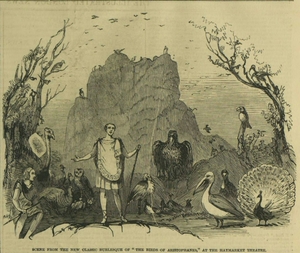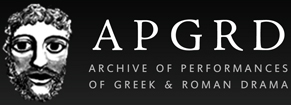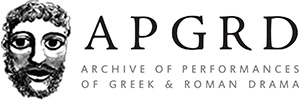
The Athenian comic playwright Aristophanes lived from the middle of the fifth century to the start of the fourth century BCE. Biographical information about him is sketchy at best. We have 11 of his plays, though he wrote at least 44. He is the sole exemplar of the genre known as ‘Old Comedy’ whose work has survived intact, although we do have significant fragments from several other important comedy writers including Eupolis and Cratinus. One of the reasons why Aristophanes’ texts survived while Eupolis’ and Cratinus’ didn’t, was because even in the ancient world, his works were quickly identified as stand-out examples of the genre. Aristophanes’ plays were produced at the City Dionysia alongside tragedies and satyr plays. He also wrote for the smaller Lenaia festival. The Lenaia was dedicated to comedy, and because it took place around January every year, when sailing in the Aegean wasn’t possible due to dangerous weather conditions, it was a more localised affair. Both festivals honoured Dionysus, the god of drama.
Unlike tragedy, which told stories of Greece’s mythical past and were almost always set outside of Athens, Old Comedy was set in the contemporary world – or at least, a parallel contemporary where fantastical things could happen and any ordinary citizen could develop heroic powers to challenge the system. Only one of Aristophanes’ comedies starts outside of Athens, and well-known Athenian figures, such as Euripides and Socrates, frequently pop up in his plays to be ruthlessly lampooned. Given the focus on politics in Aristophanes’ plays, some scholars have tried to identify from the texts whether Aristophanes was a supporter of Athenian democracy or a conservative oligarch. The difficulty is that, when reading comedy, it is never clear what is serious and what is a joke – even, and perhaps especially, when Aristophanes claims to be making a serious point, we should never take him at his own word. As Goldhill notes, that’s part of the essence of Old Comedy – ‘how far, how serious, how comic, how literal, how applicable to me, to us, to them, to you are questions that Aristophanes’ writing constantly poses for its readers and audiences’ (Goldhill, Simon 1991, The Poet’s Voice. Cambridge: CUP. 194). Watching or reading Old Comedy is therefore always an active process of interrogating the relative seriousness of it.
Whatever his personal politics, in empowering ordinary Athenian citizens in his plays to achieve fantastical feats, Aristophanes fulfils the basic democratic function of Old Comedy. The genre was both a feature and a product of the Athenian state. The licence given to comic poets to say (almost) anything about Athens’ leading statesmen was an important democratic institution; comedy has always been a potent weapon for holding those with power to account. It is no coincidence that Old Comedy did not survive the collapse of Athenian democracy. But Aristophanic comedy was not freedom of speech free from all consequence; its extreme form of aischrologia or shame-speech was only ever permitted because it was being performed as part of, and under the licence of, the dramatic festival.
The ribaldry of Aristophanic comedy is striking given the context in which most of his plays were produced. Between 431 and 404 BCE, Athens was fighting the Peloponnesian War, a great conflict with Sparta. It was a war they would ultimately lose, and from the start it led to a great deal of suffering in Athens. A number of Aristophanic plots involve characters seeking an end to the hostilities. In Acharnians, Aristophanes’ protagonist seeks a personal treaty with Sparta. In Peace, the main character ascends to Olympus to rescue the goddess Peace. Most famously, in Lysistrata, the women of Athens and Sparta stage a sex strike in order to force their men into negotiations. What is remarkable about each of these plays is the picture they give us of the discontent and suffering on the home front, and the unadulterated tone with which Aristophanes is allowed to present his ‘peace plays’. It is hard to imagine, during the height of World War One, that a British comedian would have been allowed to take to the stage and advocate – however humorously – that we make peace with Germany. It is harder still to imagine anyone laughing along with the idea.
The most important question we can ask about any comedy is, ‘how is this funny?’. Aristophanes uses a dazzling array of different techniques to make his audience laugh, from clever word puns to complex parodies of Greek tragedy. He also, of course, indulges in obscenity. The opening scene of Frogs (405 BC) demonstrates how different modes of humour can interact in Old Comedy. Xanthias, a slave, is lugging around some heavy baggage on a journey with his master, Dionysus. Xanthias asks permission to tell a funny joke as he struggles with the load (slapstick). Dionysus says he can say what he likes, as long as he doesn’t make a scatological reference (obscenity). By refusing to let his slave make such jokes, Dionysus inadvertently says the punchline himself (irony, bathos). Xanthias then complains that other comedians let their characters say rude jokes (breaking the fourth wall, intertextuality). These different modes of humour are layered on top of each other. Whether audience-members laugh at the simple scatology and slapstick, or at the more complicated pastiching of comedy, or at both, Aristophanes is making sure that there is something for everybody to laugh at. Aristophanic comedy has been criticised for not maintaining unity of plot and can appear fairly episodic to modern audiences. But Aristophanes was not concerned with telling a coherent story. His goal was to be as funny as possible.
Old Comedy would have provided its audience with stunning spectacle. The comic costume was designed to be visually provocative and grotesque. Actors wore bulbous fat suits, ugly masks and a large leather phallus which, if they were performing a male character, would hang provocatively out from beneath their short tunics. Aristophanes’ choruses often wore fantastic costumes too – he dressed them as clouds, wasps, horses, birds, and so on. Props were also utilised to maximum comic effect: in Wasps, a mock trial involves summoning to court a bowl, a pestle, a cheese-grater, a barbecue and a pot. For the duration of the trial, one of the characters is relieving himself into a chamber-pot on-stage. The same crane or mēchanē, used in tragedy to suspend a god in the air at a dramatically significant point in the plot, was used in comedy to hang actors high up, and leave them there flailing– a brilliant comic inversion of tragic sublimity. When the great philosopher Socrates comes on stage in the Clouds, it is via the mēchanē. It’s an awkward, slapstick entrance that immediately renders him ridiculous.
New Comedy gradually succeeded Old Comedy in the fourth century. The genre is best exemplified (in Greek) by the playwright Menander, only one of whose plays has largely survived. New Comedy is much less political and much less overtly obscene than Aristophanes; it is more comparable to Comedy of Manners than satire. The Roman playwrights Terence and Plautus were both heavily influenced by Menandrian New Comedy.
Fig. 2: Screenshot from Spike Lee's Chi-Raq (2015)
 Aristophanes’ modern Anglophone reception is slight compared to the towering influence of Greek tragedy. He has always been a popular choice for school and university Greek plays; Cambridge first staged Aristophanes’ Birds as early as 1883 – a choice perhaps prompted by J.R. Planché’s Birds of 1846 (see fig.1), the only professional production in Victorian Britain of an Aristophanic comedy. In 1974, Stephen Sondheim scored a musical version of The Frogs, performed in the swimming pool at Yale; it received its Broadway debut in 2004. Spike Lee directed and co-wrote Chi-Raq in 2015, an adaptation of Lysistrata exploring gun violence in America (see fig.2). By far the most influential productions of Old Comedy in the twentieth century were staged by Karolos Koun, the Greek director whose productions drew on modern Greek folk traditions and were toured throughout Europe and the United States. Greece and Italy have long and vibrant histories of staging Aristophanes. But comedy is harder to translate than tragedy – jokes often lose their humour in translation, and contemporary allusions lose meaning. So Aristophanes remains a semi-canonical playwright, even if his plays still have the potential to satirise and provoke.
Aristophanes’ modern Anglophone reception is slight compared to the towering influence of Greek tragedy. He has always been a popular choice for school and university Greek plays; Cambridge first staged Aristophanes’ Birds as early as 1883 – a choice perhaps prompted by J.R. Planché’s Birds of 1846 (see fig.1), the only professional production in Victorian Britain of an Aristophanic comedy. In 1974, Stephen Sondheim scored a musical version of The Frogs, performed in the swimming pool at Yale; it received its Broadway debut in 2004. Spike Lee directed and co-wrote Chi-Raq in 2015, an adaptation of Lysistrata exploring gun violence in America (see fig.2). By far the most influential productions of Old Comedy in the twentieth century were staged by Karolos Koun, the Greek director whose productions drew on modern Greek folk traditions and were toured throughout Europe and the United States. Greece and Italy have long and vibrant histories of staging Aristophanes. But comedy is harder to translate than tragedy – jokes often lose their humour in translation, and contemporary allusions lose meaning. So Aristophanes remains a semi-canonical playwright, even if his plays still have the potential to satirise and provoke.
Further reading
- Dover, K.J. (1972) Aristophanic Comedy. Berkeley, CA: University of California Press.
- Henderson, Jeffrey (ed.) (1981) Aristophanes: Essays in Interpretation. Cambridge: CUP.
- Olson, S. Douglas (ed.) (2014) Ancient Comedy and Reception. Berlin and Boston, MA: De Gruyter.
- Robson, James (2009) Aristophanes: An Introduction. London: Duckworth.
- Sommerstein, Alan H. (2009) Talking about Laughter. Oxford: OUP.
- Swallow, Peter and Edith Hall (eds.) (2020) Aristophanic Humour. London: Bloomsbury.
- See also Oxford Bibliographies’ entry on Aristophanes.
You can also watch Edith Hall in conversation with Kevin Willmott, co-author of Spike Lee's Chi-Raq, on the APGRD YouTube channel.


